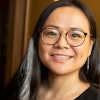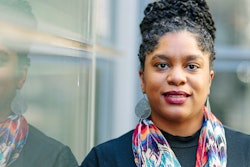Dr. Diego Villada
Title: Assistant Professor of Theatre and Performance Studies, New College of Florida
Age: 38
Education: B.S., psychology and theatre performance, University of Evansville; MFA, theatre pedagogy, Virginia Commonwealth University; and Ph.D., theatre and performance studies, University of Pittsburgh
Career mentors: Andrea Kidd, Miami-Dade Public Schools emeritus; Graciela Binaghi, Argentine mime artist; John David Lutz, University of Evansville emeritus; Christia Ward, University of Evansville emeritus; Tawnya Pettiford-Wates, Virginia Commonwealth University; Janet Rodgers, Virginia Commonwealth University emeritus; Rick Sordelet, Broadway fight director; J. David Brimmer, Broadway fight director; Lisa Jackson-Schebetta, Skidmore College; and Michelle Granshaw, University of Pittsburgh
Words of wisdom/advice for new faculty members: “The road is long. Slow down. Find places to replenish the batteries whenever possible. Just because you can (or know how to) doesn’t mean you should.”
When Dr. Diego Villada came to New College of Florida in Sarasota as assistant professor of theater and performance studies, he made a conscious decision not to teach acting with the standard 20th century texts written by white men. Instead, he sought out literature from different perspectives.
“There are specific skills that need to be taught, to be trained, but we don’t need to do that with the same plays, the same books. That comes directly from me being a Latinx artist,” said Villada. “Theater doesn’t belong to any particular culture — it belongs to the human impulse to tell stories.”
Villada selected Black Acting Methods by Dr. Sharell D. Luckett and Dr. Tia M. Shaffer as a guiding text, wanting to help his students engage with and think about performance differently.
“Now they have an entry into this way of thinking and working from the Black perspective,” said Villada. “[Students can] begin thinking about their own background. That person can ask themselves, what generation American am I? Ask their family about their background, and what does that inform about their acting work in something as simple as monologue. It’s my small way of decentralizing whiteness.”
New College’s liberal arts structure allows students with an interest in theater to take a course, whether that’s in performance, dance, or technical theater. Villada consistently works across departments, especially if the work requires a focus on marginalized populations. But his interest in theater and supporting diversity doesn’t stop at the university walls.
During his office hours, artists from Sarasota are welcome to stop by. Theater tickets are free to all who are interested. Villada works to build connections with local theater groups such as CreArte Latino Cultural Center, a local Latinx theater company, and UnidosNow, a regional organization that pairs high school students from Latinx backgrounds with a mentor to guide them through the process of applying for college.
Villada called that “my way of bringing service to my university but also to my region. I view myself as a state worker; I work for the state and the people of Florida. I see myself having a mandate to serve the people of Florida, to help artists in the community.”
Dr. Miriam Wallace, professor of English and gender studies at New College, said Villada’s scholarship is helping New College grow.
“We’re understanding better from him what the world of theater looks like and what can count as scholarship — not just peer-reviewed articles, but public facing work in the community and how you work with students,” said Wallace. “He gets us thinking about things differently.”
Wallace said Villada’s presence has made theater more accessible for their growing Latinx population. New College is on the way to becoming a Hispanic-serving institution with 18% of its student population identifying as Latinx, according to the National Center for Education Statistics. Villada worked with a Spanish and Caribbean literature student to transform her work into a Spanglish performance, and Wallace says it resonated.
“Our Latinx students were suddenly saying, ‘Oh, this could be for us!’ They had the idea that theater was by and for the white kids on campus,” said Wallace. “I saw students engaging in theater in a different way. We’re still doing Shakespeare, but there’s also contemporary, student-devised pieces. [Villada] brought a level of enthusiasm and energy, and the program just ticked up. It’s become hugely popular.”
Villada said he is proud not only of the work he’s done at New College but the way he’s been able to continue to grow professionally as a director, fight choreographer, and intimacy coach for productions. He added that he loves helping students find the joy of expressing themselves through theater, dance, and performance.
“In higher education we don’t talk about this enough — yes, salary and employability are important — but so is having a happy life and feeling fulfilled. I care about that in my students,” said Villada. “I care about the fact that my students can bring their whole selves — I don’t ask them to leave their Latinx or Blackness at the door — I try to infuse that and encourage students to connect with their cultural background.”
















